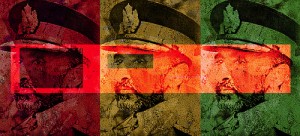The Power of Perception, the Privilege of Passing
On Friday, Elahe published a post about how fluid racial identity is for people who identify as Hispanic or Latino. Recently, the New York Times unintentionally reminded us of such fluidity when it profiled four local pundits who’ve “made it” despite their youth and facility with new media–all of them were male, “white” and friends with each other. The well-circulated piece, which starred Ezra Klein, Brian Beutler, Dave Weigel and Matt Yglesias touched a nerve:
But wait, there was more, as Elahe pointed out when she quoted Yglesias in her post:
When the New York Times recently did a piece on me, Ezra Klein, Brian Beutler, and Dave Weigel exactly zero people complained about the massive over-representation of people of Latin American ancestry that reflected. People saw it as a profile of four white dudes. Which is what it was. But my dad’s family is from Cuba, Ezra’s dad’s family is from Brazil, and Brian’s mom’s family is from Chile.
DCentric reader Keith posed an interesting question, in response to that clarification:
Isn’t there a difference between being a White-skinned Latino who identifies as Latino first and foremost and having a Latino and White parent and being White-skinned? I don’t know that any of these bloggers self-identify as Latino…
My initial reaction to Keith’s query: “not really”. Every day I am reminded that how I choose to identify myself is largely irrelevant to the people I encounter, because their perception of my appearance trumps–and thus influences–my reality. I may classify myself as a second-generation, South Asian American of Malayalee Christian descent, but that is almost never what others see.
During twelve years of living in D.C., while constantly encountering questions like, “What are you?” or “Where are you from?”, only one person has correctly discerned my exact cultural background.
Usually, the strangers with whom I interact believe that I am Ethiopian; I’m no longer surprised when “off-duty” cab drivers make illegal u-turns to pick up someone who looks, “just like my cousin in Addis!”. This may seem like a trivial detail, but it’s not, because Washington, D.C. is a city with a prominent immigrant population from that African nation. Due to the power of perception, I have become a member of a diaspora that is not mine.
When then-candidate Barack Obama faced headlines like, “What Obama Isn’t: Black Like Me.“, he answered questions about his “authenticity” as a black man this way, according to an article penned by Ta-Nehisi Coates, for TIME:
“If I’m outside your building trying to catch a cab,” he told Charlie Rose, “they’re not saying, ‘Oh, there’s a mixed race guy.’” Obama understands what all blacks, including myself, know all too well — that Amadou Diallo’s foreign ancestry could not prevent his wallet from morphing into a gun in the eyes of the police.
And perhaps inversely, the ancestry of the part-Latino pundits who were and are considered ‘White Dudes’ was not a factor in their ascending to such great heights because most people were unaware of their diverse family backgrounds. Perception trumps facts; if you are perceived as white, that can be beneficial. In the race game, the opposite of discrimination is often privilege, a concept that anti-racism activist Peggy McIntosh once defined in an essay:
As a white person, I realized I had been taught about racism as something which puts others at a disadvantage, but had been taught not to see one of its corollary aspects, white privilege, which puts me at an advantage…I have come to see white privilege as an invisible package of unearned assets which I can count on cashing in each day, but about which I was ‘meant’ to remain oblivious. White privilege is like an invisible weightless kapsack of special provisions, maps, passports, codebooks, visas, clothes, tools and blank checks.
DCentric commenter Zena deserves credit for being aware of the advantages she may have enjoyed, because of her appearance:
None of this is new for mixed race folks, especially those of us who look white (I’m half white and half Arab)…For those of us identified as “white,” regardless of our actual ethnicity, we must understand the privilege that that label might have afforded us. I’m never more conscious of that then when I am in a crowd, standing next to my very dark skinned Lebanese father. For the record, I feel most comfortable identifying as a “mixed American.”
Sometimes, when I hand out a pretty, new WAMU business card and identify that my beat is “race and class”, I’m met with annoyance and some version of the following statement: “The problem is, we focus TOO MUCH on race. Aren’t we all equal?”
While the idealism that powers such sentiments is laudable, the fact is we are a nation that must consider race. How are statistics about health, employment, housing, education and poverty often broken down? By race. Even certain laws, like those safeguarding voting rights or instituting policies like affirmative action depend on racial categorization.
A study by the Lewis Mumford Center of SUNY Albany found that while black-identified American Hispanics were less likely to be immigrants or speak a language other than English, and were more educated than other Hispanics, “their economic performance is worse, with a lower median household income than other Hispanics, as well as higher unemployment and poverty rates.”
So race matters in very real and significant ways, whether it “should” or not, whether someone identifies a certain way, or not. During Spanish colonial times in America, it was possible to purchase a Cedula de Gracias al Sacar, or a “certificate of whiteness“, that allowed the buyer–no matter their race– to access privilege for a price. Today, the only thing that guarantees privilege is how you are perceived, whether by the New York Times or the cab driver who is considering if you are a worthy customer to transport somewhere, preferably in Northwest D.C.
-
Besufekad Tadesse
-
http://thegoriwifelife.blogspot.com TheGoriWife
-
Anieb
-
guest









